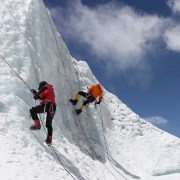 Photo: Getty Images
Photo: Getty Images
Alzheimer's disease is a growing problem in the United States: about 5.4 million people have this neurological disorder, according to the Alzheimer's Association's “2011 Alzheimer's Disease Facts and Figures”. The numbers are estimated to grow as the baby boomers are beginning to turn 65 years old. Women also have a higher prevalence of Alzheimer's disease. In the same report from the Alzheimer's Association, about two-thirds of Alzheimer's disease patients are women. “The reason more women have Alzheimer's disease is the fact that they typically live long. While Alzheimer's disease is not a normal part of aging, age is the highest risk fact of developing Alzheimer's disease,” said Angela Geiger, Chief Strategy Officer of the Alzheimer's Association in an email interview. “Research is being conducted to examine other theories that may point to why more women develop Alzheimer's disease, but no conclusions have been made and more research needs to be done in this area.”
In a campaign to raise awareness and funds for Alzheimer's disease research, Alan Arnette will climb the seven peaks around the world in one year. His campaign, called “The 7 Summits Climb for Alzheimer's: Memories are Everything,” hopes to raise $1 million dollars for research. Arnette has summited the third peak, Mt. Everest, which is his most challenging climb. He stated that through this journey, “the hardest part has been not knowing if I was reaching people through climbing. But with my Everest summit, I have been overwhelmed and gratified with the response so it feels like people are understanding that climbing is a metaphor for the challenges of Alzheimer's. It is easy to climb mountains as compared to the struggle of individuals and families with Alzheimer's. I think of my mom and her journey and that every 70 seconds [another] family starts the same tragic journey with the same ending.”
Arnette was inspired to climb these seven peaks for his mother Ida Arnette, who had Alzheimer's disease. Arnette was his mother's caretaker and told other family members who are caretakers for loved ones with Alzheimer's disease to “first take care of yourself so that you can take care of others. Reach out to local organizations for support – you do not have to be a caregiver alone. I found great comfort and help through the organizations that are part of the “The 7 Summits Climb for Alzheimer's” and that is why I encourage people to make financial donations to them. With my mom, humor was the number one tool that kept us all on track. Use it to break the tension and to let them know you love them dearly – that is what support is all about.”
Several organizations have partnered with Arnette, include the Alzheimer's Immunotherapy Program of Janssen Alzheimer Immunotherapy and Pfizer Inc., the National Family Caregivers Association and the Cure Alzheimer's Fund. A new beneficiary to the campaign is the Alzheimer's Association. “We hope that Mr. Arnette's passion for the Alzheimer's cause will draw more attention to this public heath crisis and are grateful for his efforts,” stated Geiger. “Hopefully, people will be inspired to seek the resources we are able to provide and get involved with the Alzheimer's Association by being advocated, learning more and raising funds. There are so many ways people can help or take action. To learn more, visit www.alz.org.” To learn more about Arnette's journey or to donate, visit www.Climb4AD.com or www.facebook.com/Climb4AD.
References
Alzheimer's Association. 2011 Alzheimer's Disease Facts and Figures. 2011. Web. 23 May 2011
http://www.alz.org/downloads/Facts_Figures_2011.pdf
Press Release. Alzheimer's Association Salutes Advocate and Mountaineer Now Climbing Everest as Part of The 7 Summits Climb for Alzheimer's. 10 May 2011. Email.
Correspondence with Angela Geiger, Chief Strategy Officer of the Alzheimer's Association. 20 May 2011. Email.
Correspondence with Alan Arnette. 22 May 2011. Email.
Reviewed May 24, 2011
Edited by Alison Stanton






Add a CommentComments
There are no comments yet. Be the first one and get the conversation started!